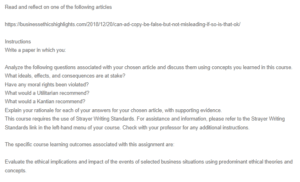Discussion – Work-Place Ethics
The stiff competition in the contemporary business world compels business organizations to opt for false advertisements. False or irrational advertisements are those adverts designed to lure customers with big promises that are not real. Many business organizations tend to design deceptive adverts to aim at convincing as many consumers as possible to make the buying decision of the product in question (Kim, & Kim, 2017). False advertisement is considered an unethical practice in the corporate world because it serves the selfish interests of the organization without minding the consumers.
False advertisements have many effects and consequences. First, false adverts tend to create a false desire among consumers in that consumers decide to buy products that could not be useful. Secondly, false adverts kill the consumers’ trust in a particular product or organization after they find out that the promises in the advert were not fulfilled hence not true (Villaran, 2017). Another consequence of the false adverts is that the company might be forced to pull down the advert, thus losing the money it spent building the advert. Moreover, false adverts could lead to fines by the business regulator authorities for breaching ethical business practices.
False advertising is a violation of moral or ethical rights. Business organizations are expected to operate with a certain level of moral right; failure to breach moral or ethical standards. Therefore, it is up to business organizations to work hard to protect and uphold their moral values by making genuine adverts rather than false adverts (Kim & Kim, 2017). Any moral organization should understand the consequences of false adverts to the consumers and the organization itself.
The utilitarian and the Kantian ethical theories have different views about the idea of false or misleading advertisements. The utilitarian theory is a moral theory that advocates for actions that foster happiness instead of actions that cause unhappiness (Raja, Lokanadha, & Narayana, 2016). People who believe in practical theory would argue that business organizations engage in false advertisement because they understand that it is the route that will give them maximum happiness.
However, the believers of the utilitarian theory also will caution that false or irrational advertisements tend to harm general happiness (Kim & Kim, 2017). Thus, business organizations have the right to engage in false advertisements, but they should know that it violates their moral principles and may lead to unhappiness. Utilitarianism would say that an action or advert is right if its result is the happiness of many people in society (Raja, Lokanadha, & Narayana, 2016). However, if the adverts lead to unhappiness to the greatest group in society, then it means that it is a wrong action.
Kantian ethical theory is based on the notion that it is impossible to think of anything in the world that could be taken as good without limitations except for goodwill. Emmanuel Kant argued that the supreme principle of morality is the standard of rationality. In his reasoning, Kant stated that an individual or organization could have moral worth only if it is motivated by morality (Raja, Lokanadha, & Narayana, 2016). This implies that business organizations that engage in false advertisements that harm consumers are not motivated by morality; they do not see any worthiness in being moral.
People who believe in Kantian reasoning believe that organizations that engage in irrational advertisements treat humanity merely as a means since they do not consider it immoral to do against humanity (Villaran, 2017). In other words, Kantian supporters would argue that organizations that propagate false adverts are immoral in that they do not see any reason why they should value morality.
References
Kim, J, & Kim C (2017). Three Perspectives about Ethical Value in Advertising Business. International Journal of Journalism and Mass Communication. Vol. 4: 124 doi: https://doi.org/10.15344/2349-2635/2017/1
Raja, R., Lokanadha, R & Narayana, R. (2016). Ethical issues in advertising to children – a Kantian perspective. International Journal of Sales & Marketing Management. Research and Development (IJSMMRD).Vol. 6, Issue 1, Feb 2016, 17-24
Villaran, A. (2017). Irrational advertisement and moral autonomy. Journal of business ethics. Vol. 144, p.479-490.
ORDER A PLAGIARISM-FREE PAPER HERE
We’ll write everything from scratch
Question

Discussion – Work-Place Ethics
Read and reflect on one of the following articles
https://businessethicshighlights.com/2018/12/20/can-ad-copy-be-false-but-not-misleading-if-so-is-that-ok/
Instructions
Write a paper in which you:
Analyze the following questions associated with your chosen article and discuss them using concepts you learned in this course.
What ideals, effects, and consequences are at stake?
Have any moral rights been violated?
What would a Utilitarian recommend?
What would a Kantian recommend?
Explain your rationale for each of your answers for your chosen article, with supporting evidence.
This course requires the use of Strayer Writing Standards. For assistance and information, please refer to the Strayer Writing Standards link in the left-hand menu of your course. Check with your professor for any additional instructions.
The specific course learning outcomes associated with this assignment are:
Evaluate the ethical implications and impact of the events of selected business situations using predominant ethical theories and concepts.

